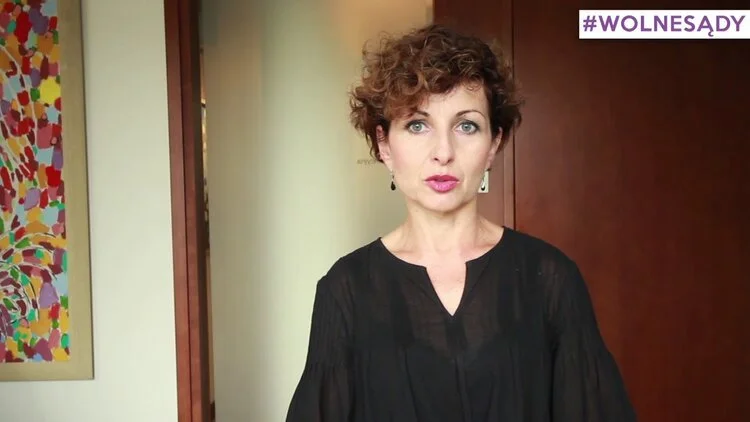Poland: Journalist Renata Kim Attacked While Covering Independence Day March
Location: Poland, Warsaw
Date: November 13, 2020Available in: 🇵🇱 PolskaJournalist of the Polish edition of Newsweek, Renata Kim, was attacked by police officers while covering a march commemorating Polish Independence Day in the capital city. The Coalition For Women In Journalism (CFWIJ) condemns such despicable acts of violence against the press and calls upon the authorities to establish consequences for this unacceptable behaviour.
“This year’s Independence March has left me with a sore kidney and burned hand”, wrote Newsweek journalist Renata Kim in the aftermath of brutal incidents that took place in Warsaw on National Independence Day. The story of the Independence March goes back to 2011, when it was firstly initiated by nationalist political organizations Młodzież Wszechpolska and Obóz Narodowo-Radykalny. Apart from regular folks and families, the event mostly gathers people with strong conservative views and those associated with far-right and nationalistic rhetoric. It is infamous for regular incidents of violence and hostility. Due to the pandemic, this year’s event did not attract as many participants as it had previously, but the lower turnout did not deter animosity.
Renata Kim was one of the journalists covering the march. She described in detail the aggressive approach of many participants who were cursing, firing smoke flares and constantly provoking the police. When the march reached the surroundings of Warsaw National Stadium, she heard police communications from megaphones, urging journalists, pregnant women and politicians to leave the terrain. “It could be a sign that the police were preparing for a direct encounter with a group of hooligans” says Renata. These men had been poking officers and devastating city property, including setting a private apartment on fire.
“As journalists, we simply couldn’t leave the place despite the tensions. Our role was to document everything and inform the public”, explained Renata in her op-ed. “When the police rushed up the stairs at a nearby metro station, we followed them. We ran up the escalator and found ourselves on the platform”.There, they noticed how police had been already pacificating some of the escaping men.
“All of the sudden the police officers turned back and pushed against the railing, those who were observing the whole situation and taking pictures. I was one of these people”, confided Renata. “Nothing stopped them. Neither us screaming that we are journalists, nor our vests with press logos on them.” She added “I put my hands up and shouted that I was there at work, but the policemen, now really enraged, were beating us with clubs”. Renata’s colleague, photojournalist Adam Tuchliński was hit on the head and was thrown down the stairs. Eventually, several journalists fell down the stairs onto the next group of police officers joining their colleagues. Luckily, this time the police let journalists pass and leave.
Apart from a sore kidney, as she was hit rather hard, Renata has a burned hand. She was burned by gas that she was removing from the face of a terrified man, who was screaming for help around the metro station, after the harrowing encounter with the police. Luckily, Renata feels good now but such disturbing incidents surely leave their mark.
This is not the only example of violence against the media that day. Photojournalist Tomasz Gutry from Tygodnik Solidarność was shot with a police smoothbore. A photo of his bloody face spread across the internet. The head of the Warsaw police assured that there is an investigation underway into the behavior of not only participants, but also the policemen on duty at the march.
This is yet another example of attacks on journalists in Poland in such a short period of time. On October 31, Gazeta Wyborcza reporters Magda Kozioł and Joanna Urbańska-Jaworska were assaulted by masked men at the women’s rally in Worcław. The reporters were taken to the hospital after suffering minor injuries.
The Coalition For Women In Journalism (CFWIJ) is indignant at the recent, disturbing developments in Poland where journalists are becoming a target, especially while reporting on sensitive and controversial issues. We call upon the government and city’s administration to strongly condemn any kind of violence towards reporters, in order to respect press freedom and make sure that perpetrators are held accountable for their behavior.
...
The Coalition For Women In Journalism is a global organization of support for women journalists. The CFWIJ pioneered mentorship for mid-career women journalists across several countries around the world, and is the first organization to focus on the status of free press for women journalists. We thoroughly document cases of any form of abuse against women in any part of the globe. Our system of individuals and organizations brings together the experience and mentorship necessary to help female career journalists navigate the industry. Our goal is to help develop a strong mechanism where women journalists can work safely and thrive.
Follow us on Instagram @womeninjournalism and Twitter @CFWIJ. Our website is WomenInJournalism.org and we can be reached at press@womeninjournalism.org
The Coalition For Women In Journalism closely monitors the incidents in Turkey with great concern. Since March 8, Women's Day, police violence against women journalists increasingly continues in the country. As the coalition, we urge the Turkish state to provide a free environment for journalists. Following the news is our most fundamental democratic right to report. We demand the immediate release of our detained colleagues. Journalism is not a crime. Journalism cannot be prevented.
If you have been harassed or abused in any way, and please report the incident by using the following form.






